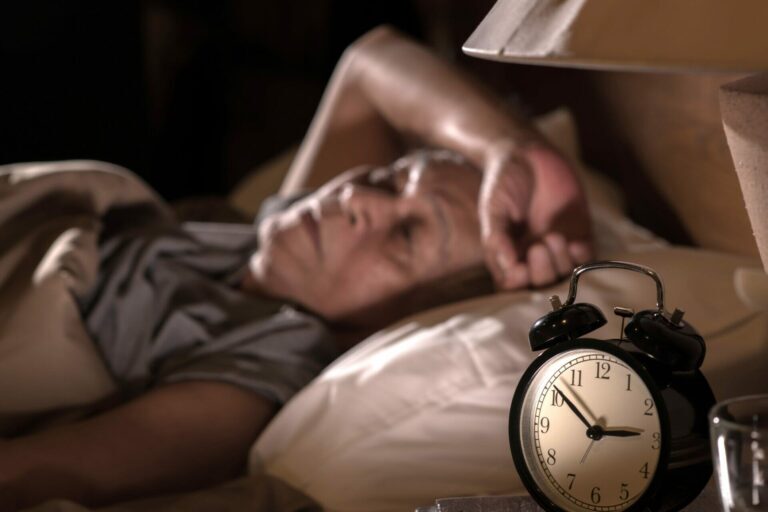One of the most common misconceptions about aging is that the older we get, the less sleep we need. Sleep experts say that’s just not true. Adults need between seven and nine hours of quality sleep each night. And that number doesn’t change as we age.
What does change, however, is the prevalence of insomnia and other sleep disorders among our older population. Research shows that as many as 50% of people over the age of 60 experience sleep issues. Many struggle to get a good night’s rest, give up trying and eventually settle for a short night of less-than-ideal sleep. This might be how the myth that older adults need less sleep originated.
What Is Insomnia?
Insomnia is defined as a condition in which a person has difficulty falling or staying asleep. A good night of rest occurs in several stages, beginning with light, dreamless sleep. It progresses to periods of active dreaming known as rapid eye movement (REM) sleep. As we age, sleep patterns change, and the amount of time you spend in each stage of sleep can be impacted. It can cause seniors to wake up frequently throughout the night or to awaken and be unable to fall back to sleep.
A few of the most common insomnia symptoms include:
- Difficulty falling asleep
- Poor quality sleep
- Waking up at least three times throughout the night
- Changes in circadian rhythm (i.e., going to sleep and waking up earlier)
Reasons Seniors Have Trouble Sleeping
Sleep disturbances and disorders among older adults can stem from a variety of causes, some of which can be treated. They may be the result of certain health issues, such as cardiovascular disease, chronic obstructive pulmonary disease, anxiety, depression, sleep apnea or asthma. Another factor might be chronic pain associated with a condition like osteoarthritis or an autoimmune disease.
Environment can also play a role in sleep quality. If the bedroom is noisy, not dark enough or too warm, it can interfere with rest. Then there is the possibility that poor sleep is a side effect of a medication. Beta blockers—a class of drugs used to treat high blood pressure, arrhythmias and angina—are prescribed for many seniors and can increase the risk for insomnia.
Finally, a lack of exercise might be the reason an older adult is having problems. Too much sitting and not enough moving can make you feel tired and sluggish, but that doesn’t translate to good quality sleep. According to the National Library of Medicine, a lack of exercise is associated with insomnia at every age.
Ideas for Overcoming Insomnia and Getting a Good Night’s Sleep
If you aren’t able to enjoy a good night’s rest on a regular basis, these suggestions might help change that:
- Establish a relaxing bedtime routine: Try to go to bed around the same time every night and rise at the same time each morning. Having a routine can help calm the mind and body. Turn off all electronic devices at least an hour before heading to bed. Instead, try to involve yourself in soothing activities, such as reading a relaxing book or taking a warm bath with lavender Epsom salts.
- Create a comfortable sleeping environment: Your bedroom should be a peaceful setting, free of loud noises and distractions. It’s also important to have a restful mattress and soft sheets. Another tip for creating a soothing sleep environment is to turn the thermostat down a bit overnight.
- Exercise early in the day: While daily exercise is important, it can raise your body’s core temperature and give you a boost of adrenaline. Both can make sleeping more difficult. Try to do your workout in the morning or at least three hours before bedtime.
- Avoid late naps: If you can avoid taking a daily nap altogether, that’s best. However, if you have to nap, do so earlier in the day. That helps prevent daytime shut-eye from interfering with your ability to fall asleep.
- Limit caffeine and alcohol: Caffeine, alcohol and other stimulants should be consumed in moderation and avoided during late afternoon and evening hours. While they may not prevent you from falling asleep initially, they might cause you to wake up in the night and be unable to return to sleep.
- Clear your mind: If possible, try to deal with the day’s worries before getting in bed. Calm your mind and focus on peaceful thoughts. Exploring meditation, journaling and other activities that promote emotional resilience might be beneficial.
If, despite your best efforts, a good night of sleep continues to elude you, it’s probably time to schedule a visit with the doctor. They might be able to figure out the root cause or order a sleep study.
Learn More About American Senior Communities (ASC)
ASC is committed to creating communities where residents thrive. With over 100 locations throughout Indiana, we’re proud to be the largest health care provider in the state. Whether you are looking for independent living in a garden home or therapy to continue recovering from a surgery or illness, you’ll likely find a community nearby. Visit our website to find a location near you.




